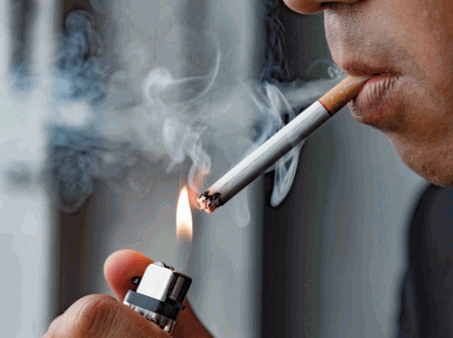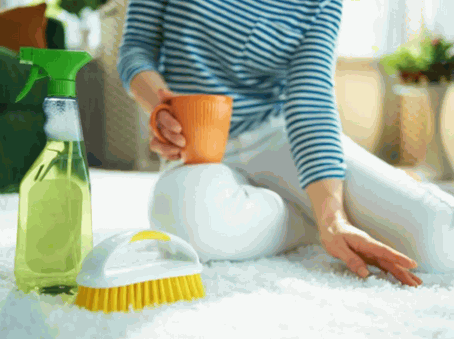
Whether you're an ex-smoker or you've never touched tobacco products in your life, the smell of old cigarette smoke is rarely welcome in any home.
Most non-smokers find the aroma of cigarette smoke pretty unpleasant, and those who stop smoking often tend to agree after a while as their sense of smell begins to improve.
But what can you do if you've moved into a property affected by cigarette smoke, or you've stopped smoking and now you realise how bad the odour is?
In this Clean Team Scotland blog, we will investigate ways to help you eliminate this unwanted smell from your home for good!

To understand how to deal with the issue of lingering smells from cigarettes, we need to explain why they hang around so much in our homes...
The main problem is that cigarette smoke is made up of thousands of chemicals including tar, benzene, formaldehyde, hydrogen cyanide, nicotine, cadmium and carbon monoxide! Some of these chemicals are sticky and heavy and will cling to all kinds of surfaces. Substances like tar and nicotine are especially prone to sticking to walls, upholstered furniture, carpets, clothes, soft toys, cushions, and curtains.
In a heavy smoker's house, these substances eventually form a sticky layer on everything, from the TV to the ceiling. Once the problem reaches this stage, removing it can be a real challenge.
The smoke itself is made up of tiny particles (often less than one micron in size) that float around in the air without settling, eventually finding their way to every corner of the room.
Any porous materials (especially fabrics and upholstery) will absorb smoke particles (sometimes called third-hand smoke) and release them slowly over time, causing the smell to stay around for a very long time.
Some of the chemicals in cigarettes are hydrophobic, meaning that they actively repel water. This makes them difficult to wash away with water-based cleaning products, even on hard surfaces.
Very few people realise this fact, and many would avoid smoking inside their homes if they knew!

Now we know why that unpleasant smoke smell is so difficult to shift, so it's time to investigate ways to resolve the problem effectively.
We'll start with a very obvious one:
The longer you continue to smoke inside, the harder it will be to eliminate smoke smells. While you can apply temporary fixes, such as air fresheners and fabric sprays, the underlying cause remains.
Try to take your cigarette break outdoors or, better still, try giving up completely - it's better for your health and your finances!
This is entirely up to you, of course, but if you do smoke indoors remember to empty the ashtrays frequently as these are a major contributor to the cigarette smell problem.

Ensure that your home has adequate ventilation by keeping windows and doors open as much as possible when the weather allows to improve the overall air quality.
This won't dislodge any smoke particles that are stuck to fabrics or upholstered furniture, but it will dilute the odour and create a more pleasant atmosphere indoors.
If you have an HVAC system in your home, replace the air filters regularly. Alternatively, use an air purifier to freshen up your home, making sure to choose a model with HEPA filters. Remember to check the filters on your air purifiers regularly and clean or replace them as required.
You could also try room or fabric fragrance sprays or like The Leather Colour Doctor says leather fragrance sprays, although these generally mask smells and won't eradicate them. The trouble with these products is that they are only designed to work for a short while - if they were long-lasting and effective you wouldn't need to buy as many!
At the end of the day, the fragrances will fade and the thirdhand smoke smell will start to haunt you once again...
So, while they can help, they're not a long-term solution.
Some people have tried all kinds of remedies to remove smoke smells, including the following:
You're welcome to try any of these ideas, but there's no getting around this fact: the best way to get rid of the smell of cigarettes in your home once and for all is through thorough cleaning.

Your first step is to tackle all soft furnishings and fabrics, as smoke will cling to these and get deep into the fibres.
All removable items (curtains, cushion covers, rugs, etc.) should be washed according to their wash care instructions, then let the items air dry. Some experts suggest adding baking soda or white vinegar to the wash as this increases the odour-neutralising power. However, be very careful if you choose to do this, as it may harm the fabric.
Steam clean any upholstered furniture or fabric that can't be washed in a machine using a hand-held steam cleaner. Alternatively, use a branded upholstery shampoo and follow the instructions.
Sprinkle baking soda on your carpet and leave it for at least 15 minutes before vacuuming it.
Next, wipe down any hard surfaces, such as walls, ceilings, floors and wooden furniture. Don't forget light fixtures and fittings. Use a mixture of warm water, white vinegar and mild dish soap, and wring the cloth out thoroughly before wiping down all the surfaces in the room.
You could also add a few drops of an essential oil of your choice to add a fresh aroma to the home.
Nicotine is notoriously sticky and can be a real problem to shift. If you're faced with this scenario, you might need a helping hand, as the water/vinegar/soap mix may not be powerful enough to remove stains.
To overcome this problem you could try using an industrial degreaser or cleaner. For example, any product containing trisodium phosphate would be up to the job.
Ammonia is also recommended by many experts, and this is a highly effective method. However, take care to dilute it properly (one cup of ammonia to 3.5 litres of clean water) and never mix it with other products, especially bleach!
Rinse the affected areas thoroughly to ensure that they are clean and free from ammonia.

Although the methods above can be effective, sometimes you need a bit of extra help.
Professional cleaners, like Clean Team Scotland, have far more powerful methods at their disposal. For example, we use industrial-grade cleaning equipment and solutions, alongside ozone generators and odour neutralisers.
In addition, our experts are trained to apply a range of highly effective methods and will select the most suitable of these for your specific needs.
By all means, tackle the problem yourself using the tips we've suggested here, but when you need us, Clean Team Scotland is ready to spring into action!




